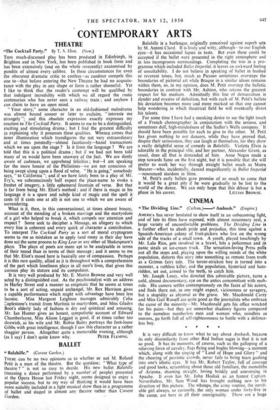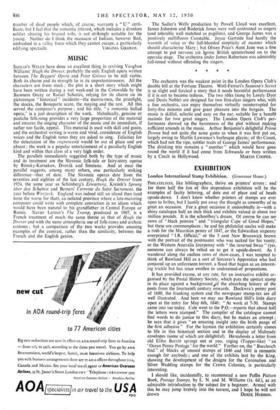CINEMA
"The Dividing Line." (Carlton.)•■■•" Ambush." (Empire.) AMERICA has never hesitated to show itself in an unbecoming light, and of late its films have exposed, with almost missionary zeal, a large variety of uncomfortable problems. The Dividing Line is a further effort to abash pride and prejudice, this time against a Spanish-American colony of fruit-pickers who live on the wrong side of the tracks of a small town. A youth, played touchingly by Mr. Lalo Rios, gets involved in a brawl, hits a policeman and in panic steals an ice-cream truck. The sensation-loving Press pulls out all the stops and, playing upon the willing minds of the white population, distorts this story into something as remote from truth as a Grimm fairy tale. The terror-stricken boy is turned into a monster, a ruthless killer, and the population, hysterical and hate- ridden, set out, armed to the teeth, to catch him.
Mr. Joseph Losey, who directed this admirable picture, turns a cold, almost documentary, eye on the antics concomitant with mob- rule. His camera settles contemptuously on the faces of his actors, and finds there not, as one might expect, viciousness or savagery, but a stupidity as abysmal as the grave. Mr. Macdonald Carey and Miss Gail Russell are quite good as the journalists who embrace the cause of the minority—Mr. Macdonald gets his office wrecked for his pains—but they are somewhat shadowy figures compared to the nameless numberless men and women who, mindless as morons, go forth full of self-righteousness to battle with a defence- less boy. * * * * It is very difficult to know what to say about Ambush, because its only dissimilarity from other Red Indian sagas is that it is not so good. It has its moments, of course, such as the galloping of a relieving force of cavalry, flags flying and bugles blowing—a moment which, along with the singing of " Land of Hope and Glory " and the cheering of patriotic crowds, never fails to bring tears gushing into one's idiotic eyes. It has Mr. Robert Taylor, full of courage and good looks, scrambling about those old familiars, the monoliths of Arizona, shooting straight, loving briskly and conversing in Apache. It even has Mr. John Hodiak as an honest Captain. Nevertheless, Mr. Sam Wood has brought nothing new to his direction of this picture. The whoops, the army routine, the inevit- able girl always, so curiously, the only woman under forty-five in the camp, are here in all their unoriginality. There are a huge number of dead people which, of course, warrants a " U " certi- ficate, but I feel that the romantic interest, which includes a drunken soldier abusing his bruised wife, is not strikingly suitable for the young. Neither do I think the massacre of Indians, however Red, ambushed in a valley from which they cannot escape, a particularly







































 Previous page
Previous page